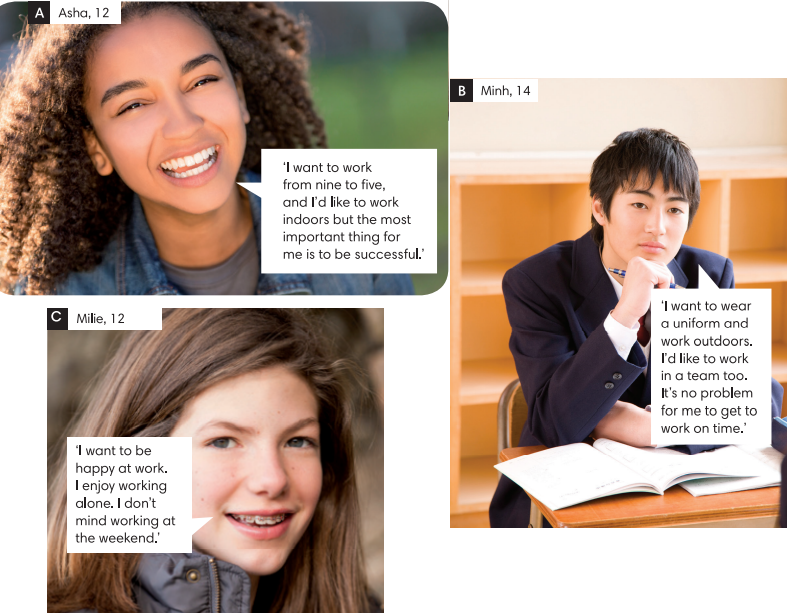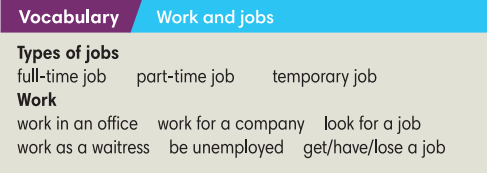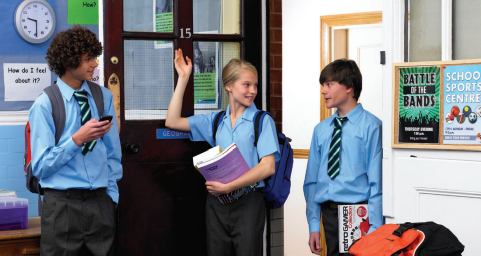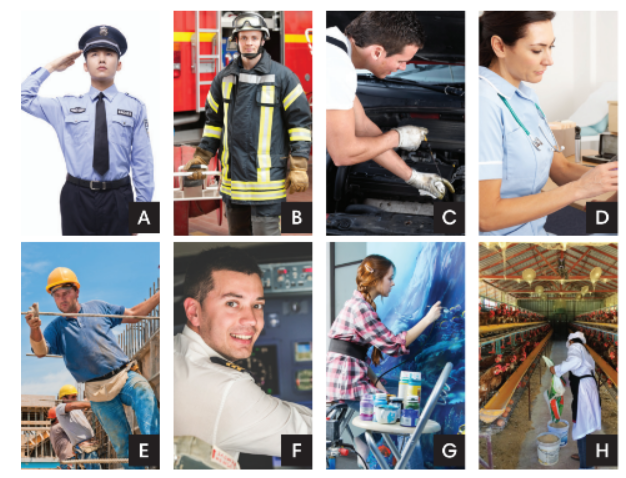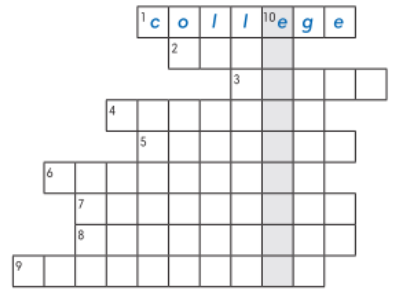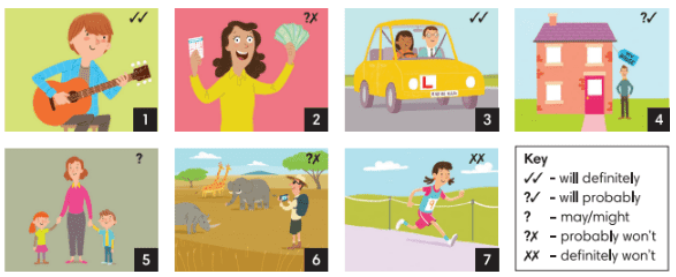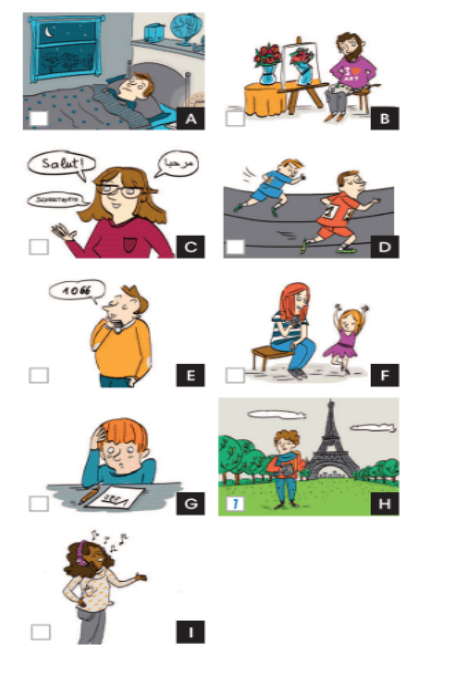Giải SGK, SBT Unit 10. My dream job English Discovery
Giải SGK, SBT Unit 10. My dream job English Discovery
1. Work in groups. Which jobs below are in the photos? How many jobs can you think of in two minutes?
(Làm việc theo nhóm. Những công việc nào dưới đây có trong các bức ảnh? Bạn có thể nghĩ ra bao nhiêu công việc trong hai phút?)
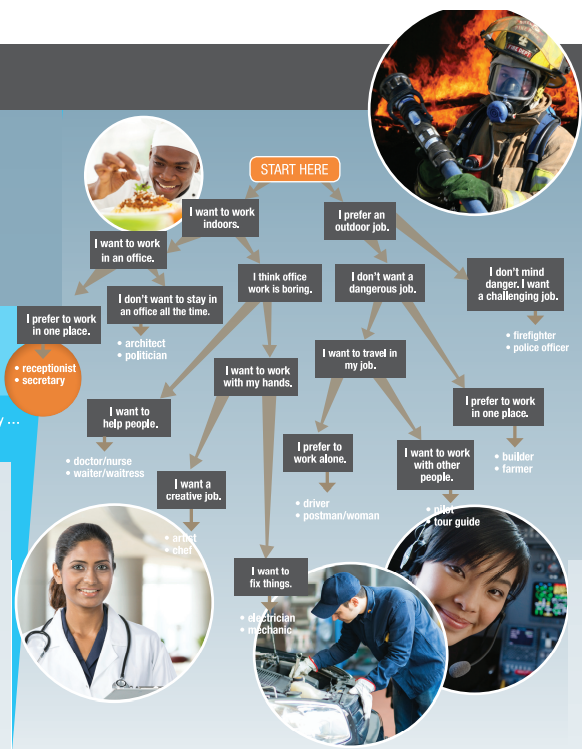
|
Vocabulary (Từ vựng) |
Jobs (Công việc) |
|
architect (kiến trúc sư) artist (nghệ sĩ/ họa sĩ) builder (thợ xây) chef (đầu bếp) doctor (bác sĩ) driver (tài xế) electrician (thợ điện) farmer (nông dân) firefighter (lính cứu hỏa) mechanic (thợ máy) |
nurse (y tá) pilot (phi công) politician (chính trị gia) polic officer (cảnh sát) postman/ woman (bưu tá) receptionist (lễ tân) secretary (thư ký) tour guide (hướng dẫn viên du lịch) waiter/ waitress (phục vụ bàn) |
2. Read the text and tick (✓) the things the writer mentions. Would you like all your lessons at home?
(Đọc văn bản và đánh dấu (✓ ) vào những điều người viết đề cập. Bạn có muốn tất cả các bài học của bạn ở nhà?)
|
|
break (giờ giải lao) |
|
school uniform (đồng phục trường) |
|
|
test (bài kiểm tra) |
|
homework (bài tập về nhà) |
|
|
timetable (thời gian biểu) |
|
course book (sách học) |
|
|
classroom (phòng học) |
|
|
A school day in 2035?
Higson Corporation Global Schools - Saturday 5 May 2035, 08.57 a.m.
Good morning, Emily!
Your Maths test will start in three minutes. There's an online meeting with your Chinese teacher at 10 a.m. Have a nice day!
Education will be very important in 2035 but children won't go to school. So how will they learn? They will study in their bedrooms at home. Computers will organise the timetable for each day. Pupils will do all their homework and tests online, because we won't have paper course books. They'll only have contact with their teachers through the internet. But will they enjoy their lessons? No, they won't - some things will never change!
3. Find more example of will/won’t in the text in Exercise 2.
(Tìm thêm ví dụ về will / won’t trong văn bản ở Bài tập 2.)
|
Grammar |
Will for future predictions |
|
+ |
- |
|
I will work hard. (Tôi sẽ làm việc chăm chỉ.) They will play. (Họ sẽ chơi.) |
I won’t work hard. (Tôi sẽ không làm việc chăm chỉ.) They won’t play. (Họ sẽ không chơi.) |
|
? |
|
|
Will you study a lot? (Bạn sẽ học nhiều không?) – Yes, I will. / No, I won’t. Will the children play games? (Những đứa trẻ sẽ chơi trò chơi không?) – Yes, they will. / No, they won’t. How will they learn? (Họ sẽ học như thế nào?) |
|
|
Time expressions: (Cụm từ chỉ thời gian) in 2035 / twenty years’ time/ the next five years/ the future (vào năm 2035/ trong thời gian 20 năm/ 5 năm nữa/ trong tương lai) by (=before) 2035/ Christmas/ my twentieth birthday (trước 2035/ Giáng sinh/ sinh nhật lần 20 của tôi) |
|
|
I don’t think this will happen. NOT I think this won’t happen. (Tôi nghĩ điều này sẽ không xảy ra.) |
|
6. Tick (✓) the things you think you will do before your twentieth birthday.
(Đánh dấu những việc em nghĩ em sẽ làm trước sinh nhật lần thứ 20.)
|
|
learn to drive (học lái ô tô) |
|
|
go to university (học đại học) |
|
|
work or study abroad (làm việc hoặc học ở nước ngoài) |
|
|
get married (kết hôn) |
|
|
buy a house or a flat (mua nhà hoặc chung cư) |
2. In pairs, check if you understand the meanings of the words or phrases below.
(Theo cặp, hãy kiểm tra xem bạn có hiểu nghĩa của các từ hoặc cụm từ bên dưới không.)
|
uniform (be) on time tough walks of life admire mind |
3. Listen. Then find examples of the phrases below in the dialogue. Who is the most confident about passing the exam?
(Nghe. Sau đó, tìm ví dụ về các cụm từ bên dưới trong đoạn hội thoại. Ai là người tự tin nhất về việc vượt qua kỳ thi?)
I'LL DEFINITELY PASS
Amy: Gosh! That was a really difficult test.
Billy: Yes! That last question? What a nightmare! I couldn't remember any of the dates. I probably won't get any points for it!
Amy: I definitely won't! I didn't even answer that question - I didn't have time!
Billy: Oh, don't worry, Amy. You'll probably pass!
Amy: I don't know. I might pass. Fingers crossed! How about you, Lee?
Lee: I thought it was easy! I'll definitely pass! In fact, I think I may get a ten.
Amy: But History's your worst subject. You didn't cheat, did you? Because they'll definitely see from your answers that you cheated!
Lee: No, I didn't cheat!
Billy: So, how did you do it?
|
Speaking (Nói) |
Probability (Khả năng xảy ra của sự việc) |
|
• I will definitely/probably pass. (Tôi chắc chắn / có lẽ sẽ thi đỗ.) • | may/might pass. (Tôi có thể thi đỗ.) • I definitely/probably won't pass. (Tôi chắc chắn / có lẽ sẽ không đỗ.) |
|
3. Find examples of the adjectives with prepositions in Exercise 2.
(Tìm ví dụ về các tính từ có giới từ trong Bài tập 2.)
|
Language (Ngôn ngữ) |
Adjectives with prepositions (Tính từ với giới từ) |
|
After these phrases we add verb + -ing: (Sau những cụm từ này chúng ta thêm -ing) (not very) good at, crazy about, keen on, (really) bad at, afraid of, fond of, hopeless at, brilliant at, interested in Bruce is good at counting. (Bruce giỏi thực hiện các phép tính.) Wendy is fond of talking. (Wendy thích trò chuyện.) |
|
4. In pairs, use the teacher’s notes and this jobs to make predictions about the children in the picture.
(Theo cặp, sử dụng ghi chú của giáo viên và công việc này để đưa ra dự đoán về những đứa trẻ trong hình.)
|
account (kế toán) |
artist (nghệ sĩ/ họa sĩ) |
athlete (vận động viên) |
|
astronaut (phi hành gia) |
doctor (bác sĩ) |
nurse (y tá) |
|
pilot (phi công) |
police officer (cảnh sát) |
Politician (chính trị gia) |
Bruce is good at counting. I think he’ll be an accountant.
(Bruce giỏi về các phép tính. Tôi nghĩ bạn ấy sẽ là kế toán.)
6. In groups, use the phrases in Exercise 3 and the skills below to ask and answer questions.
(Theo nhóm, sử dụng các cụm từ trong Bài tập 3 và các kỹ năng dưới đây để hỏi và trả lời câu hỏi.)
|
learn languages work with your hands talk watch car races play the guitar sing do Maths problems do Sudoku puzzles dance read science books save money remember things drive fast |
A: Are you good at dancing?
(Bạn có giỏi nhảy múa/ khiêu vũ không?)
B: No, I'm not good at dancing bit I'm good at singing.
(Không, tôi không giỏi về nhảy múa nhưng tôi giỏi ca hát.)
6. Complete the dialogue with the correct form of the First Conditional.
(Hoàn thành đoạn hội thoại với dạng đúng của Điều kiện đầu tiên.)
|
Ann: Bea: Ann:
Bea: Ann: Bea: Ann: Bea: |
How are you getting to your job interview? By bike. The farm isn’t far from town. But what 1will you do (you/do) if the weather 2 ______(be) bad? It’s OK. If it 3______ (rain), I 4______(take) the ten o'clock bus. But if the bus 5_______ (arrive) late, how 6_______ (you/get) there then? I 7_______ (phone) for a taxi if something 8_______ (go) wrong. But if there 9_______ (not be) a signal, you 10_______ (not able to phone) for a taxi. You worry too much! |
3. Read the text. Mark the sentences ✓ (right), X (wrong) or ? (doesn't say).
(Đọc văn bản. Đánh dấu các câu ✓ (đúng), X (sai) hoặc ? (không đề cập đến).)
|
✓ |
1. The writer believes that children often want to have the same job as famous people or people they know. |
|
|
2. The writer wanted to be on television. |
|
|
3. The writer works on television now. |
|
|
4. Boys and girls have different types of dream jobs. |
|
|
5. Today's children will earn more than their parents did. |
|
|
6. It isn't a good idea to have an unrealistic dream. |
|
|
7. The writer thinks that people's dreams stay the same through their lives. |
What was your dream?
What were your dreams and ambitions when you were a child? Are your dreams the same now? Nearly all children have a dream for the future. Sometimes they want to be like people they see on television or someone in their family. When I was a child I wanted to be a lawyer because I admired the lawyer in a TV drama! My sister wanted to be a princess!
A recent survey asked 11,000 seven-year-olds about their ambitions and the results were interesting. Most of them had definite ideas about their future careers. The most popular jobs included teacher, scientist, firefighter and police officer. In general boys wanted to earn a lot of money (a third of them wanted to become a footballer or sportsman) and girls preferred a job helping people, like a doctor or teacher.
Experts say that today's children have greater ambitions than their parents had and this is a very good thing. People who have a dream will work harder and have fewer problems. Sometimes those dreams aren't realistic and they change. Not every seven-year-old boy will become a rich and successful footballer! I didn't become a lawyer - and surprisingly, my sister didn't become a princess! But it is important to be ambitious, We all need to dream.
4. Complete the sentences with the correct words.
(Hoàn thành các câu với các từ đúng.)
| ambitious (admired) realistic princesses definite survey |
1. When I was young I admired my cousin who was a police officer because he seemed so strong.
(Khi tôi còn trẻ, tôi ngưỡng mộ anh họ của tôi, một cảnh sát vì anh ấy có vẻ rất mạnh mẽ.)
2. If I'm _____, I don't think I'll ever be very rich.
3. Let's answer the questions in this _____. It looks interesting.
4. My brother isn't very _____. He just wants an easy job.
5. It will be sunny tomorrow. That's _____ !
6. Some _____ work very hard these days.
CÁC BÀI TẬP KHÁC


